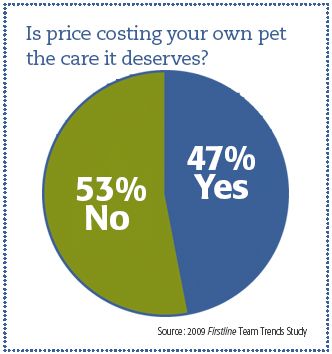Practice what you preach
You talk to clients daily about the importance of complying, but do you follow your own advice? It's time to reflect on your recommendations.
It's no surprise that 97 percent of team members own at least one dog or cat. Your love for animals is probably what drew you to your job in the first place. What is unexpected is that barely half of the team members we surveyed who are also pet parents comply with their own basic pet-care recommendations.
What does it matter?
"If we have poor compliance with recommendations among the leaders and staff, it's almost impossible to make improvements in client compliance," says Dr. Christine Merle, MBA, CVPM, with Brakke Veterinary Practice Management Group. "And although we've made strides in compliance with clients, we still have the team's compliance to improve."

GREG PAPROCKI
Why aren't you complying?
Problem: Lack of personal belief. You sell clients annual heartworm tests, for example, but you don't buy into their value. Why? Perhaps you keep your pets on year-round heartworm preventives so you don't feel it's necessary to opt for the yearly tests. Or maybe last year's screening came back clear so you feel safe skipping it this year.
Dr. Merle has two theories about what's behind teams' low numbers. Here they are, along with ideas for improvement.

Solution. Feeling and knowing aren't the same thing—no matter your expertise in the field. Relying on past results or hunches for your pet's current and future health isn't, well, reliable. Pets are known for hiding illness and for aging rapidly compared to people. The next time you're about to recite your sermon on senior wellness exams or parasite prevention, pause and truly evaluate your words. Talk as if you're trying to convince yourself. If you wouldn't comply, change your approach.
Problem: Monetary concerns. Everyone is pinching pennies these days—and wisely so. But what's a better investment than your own pet's health? Besides, it's a lot cheaper to pay for prevention than treatment.
Solution. Take advantage of any employee discounts or bundled services your practice offers. Look into third-party payment plans or pet insurance—they're not just for clients—to cover care costs. Plus, using these options yourself makes you better equipped to tell clients about them.

Another solution: The clinic must make compliance expectations clear. "As a practice, set minimum standards of care that apply to both clients and staff alike," Dr. Merle says. "The minimum must be met (by team members), but then there may be some additional, optional recommendations."
It's trite but true: Actions speak louder than words. So take a tip from yourself and comply with basic care recommendations.